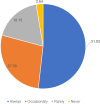Knowledge, Attitude, and Practice on Over-the-Counter Drugs Among Pharmacy and Medical Students: A Facility-Based Cross-Sectional Study
- PMID: 32983946
- PMCID: PMC7501988
- DOI: 10.2147/IPRP.S266786
Knowledge, Attitude, and Practice on Over-the-Counter Drugs Among Pharmacy and Medical Students: A Facility-Based Cross-Sectional Study
Abstract
Background: Self-medication with over-the-counter (OTC) medications is common among medicine and health science students. For safe use of OTC medications, students are expected to have proper knowledge, attitude, and practice (KAP) towards OTC medications and subsequent adverse drug reactions (ADRs).
Objective: The aim of this study was to assess KAP of OTC medications use and related factors among medical and pharmacy students at the University of Gondar, Gondar, Northwest Ethiopia.
Methods: A cross-sectional study was conducted. Data were collected using a self-administered questionnaire and analyzed using Statistical Package for Social Sciences (SPSS) version 24. Chi-square analysis was conducted and multivariable logistic regression analysis was used to determine the association between KAP and OTC use and its related adverse effects. A P value of less than 0.05 was used to declare statistical significance.
Results: A total of 380 students (229 medical students and 151 pharmacy students) participated in the study. The majority of the respondents 303 (79.7%) reported that they have the practice of self-medication. Fever 69 (80.2%), headache 21 (24.4%), and abdominal cramp 20 (23.3%) were the most common conditions for which the students go for self-medication while paracetamol 51 (59.3%) followed by non-steroidal anti-inflammatory drugs (NSAIDs) 44 (51.2%) were the most commonly used classes of drugs. An intention for time-saving caused by the waiting time due to crowds in medical consultation rooms 212 (77.4%) and a desire for quick relief 171 (62.4%) were the main reasons for the self-medication practice with OTC medications.
Conclusion: Self-medication is widely practiced among medical and pharmacy students. Significant problems and malpractices were identified, such as sharing of OTC medications, the use of expired medicines, doubling the dose of medications when they were ineffective, storage of OTC medications, and not reading labels and expiry dates.
Keywords: Gondar; medical students; over-the-counter; pharmacy students; self-medication.
© 2020 Bekele et al.
Conflict of interest statement
The authors declare that they have no competing interests.
Figures



Similar articles
-
Knowledge and attitudes toward over-the-counter medications among pharmacy students: insights from a cross-sectional study in Taif University, Saudi Arabia.Front Med (Lausanne). 2024 Nov 12;11:1435707. doi: 10.3389/fmed.2024.1435707. eCollection 2024. Front Med (Lausanne). 2024. PMID: 39600929 Free PMC article.
-
Knowledge, Attitude, and Practice of Medical, Pharmacy, and Nursing Students Towards Pharmacovigilance and Adverse Drug Reaction Reporting at University of Gondar College of Medicine and Health Sciences, Northwest Ethiopia: A Cross-Sectional Study.Adv Med Educ Pract. 2021 Oct 2;12:1129-1139. doi: 10.2147/AMEP.S327739. eCollection 2021. Adv Med Educ Pract. 2021. PMID: 34629925 Free PMC article.
-
Self-medication with over the counter drugs, prevalence of risky practice and its associated factors in pharmacy outlets of Asmara, Eritrea.BMC Public Health. 2019 Feb 6;19(1):159. doi: 10.1186/s12889-019-6470-5. BMC Public Health. 2019. PMID: 30727984 Free PMC article.
-
[Recent Social Background and Consumer Views on Over-the-counter Drugs and Self-medication].Yakugaku Zasshi. 2020;140(3):423-434. doi: 10.1248/yakushi.19-00117. Yakugaku Zasshi. 2020. PMID: 32115565 Review. Japanese.
-
Self-Medication Practices Among the Geriatric Population: A Systematic Literature Review.Cureus. 2023 Jul 21;15(7):e42282. doi: 10.7759/cureus.42282. eCollection 2023 Jul. Cureus. 2023. PMID: 37609089 Free PMC article. Review.
Cited by
-
Self-medication practice among the general public in Jordan: a cross-sectional study.Front Public Health. 2024 Oct 17;12:1433464. doi: 10.3389/fpubh.2024.1433464. eCollection 2024. Front Public Health. 2024. PMID: 39484352 Free PMC article.
-
Self-Medication Prevalence and Factors Associated with Knowledge and Attitude Towards Self-Medication Among Undergraduate Health Science Students at GAMBY Medical and Business College, Bahir Dar, Ethiopia.Patient Prefer Adherence. 2022 Dec 5;16:3157-3172. doi: 10.2147/PPA.S390058. eCollection 2022. Patient Prefer Adherence. 2022. PMID: 36506105 Free PMC article.
-
Public Awareness and Practice Regarding Over-the-Counter Medications: A Cross-Sectional Study in Al-Ahsa, Saudi Arabia.Cureus. 2024 Apr 16;16(4):e58410. doi: 10.7759/cureus.58410. eCollection 2024 Apr. Cureus. 2024. PMID: 38756269 Free PMC article.
-
Knowledge, Attitude, and Practice Towards Responsible Self-Medication Among Pharmacy Students: A Web-Based Cross-Sectional Survey in Uganda.Drug Healthc Patient Saf. 2025 Jan 7;17:7-23. doi: 10.2147/DHPS.S496924. eCollection 2025. Drug Healthc Patient Saf. 2025. PMID: 39802748 Free PMC article.
-
An exploration of individual knowledge and behavior for utilizing OTC drugs and dietary supplements for health enhancement: An empirical analysis from Dubai.Pharm Pract (Granada). 2021 Oct-Dec;19(4):2564. doi: 10.18549/PharmPract.2021.4.2564. Epub 2021 Oct 29. Pharm Pract (Granada). 2021. PMID: 35474651 Free PMC article.
References
-
- Aishwaryalakshmi K, Sasikala B, Sreelalitha N, Vigneshwaran E, Reddy YP. Assessment of knowledge perception and attitudes on medications in the general population. Editorial Board. 2012;6.
-
- World Self-Medication Industry (WSMI). Responsible self-care and self-medication: a worldwide review of consumer surveys. Ferney-Voltaire: WSMI. Available from: http://www.wsmi.org/wp-content/data/pdf/wsmibro3.pdf. Accessed August20, 2020.
-
- Azhar MIM, Gunasekaran K, Kadirvelu A, Gurtu S, Sadasivan S, Kshatriya BM. Self-medication: awareness and attitude among the Malaysian urban population. Int J Collab Res Intern Med. 2013;5(6):436.
-
- Beyene A, Getachew E, Doboch A, Poulos E, Abdurahman K. Knowledge, attitude and practice of self-medication among pharmacy students of rift Valley University, Abichu campus, Addis Ababa, Ethiopia. J Health Med Informat. 2017;8(269):2. doi:10.4172/2157-7420.1000269 - DOI
LinkOut - more resources
Full Text Sources

